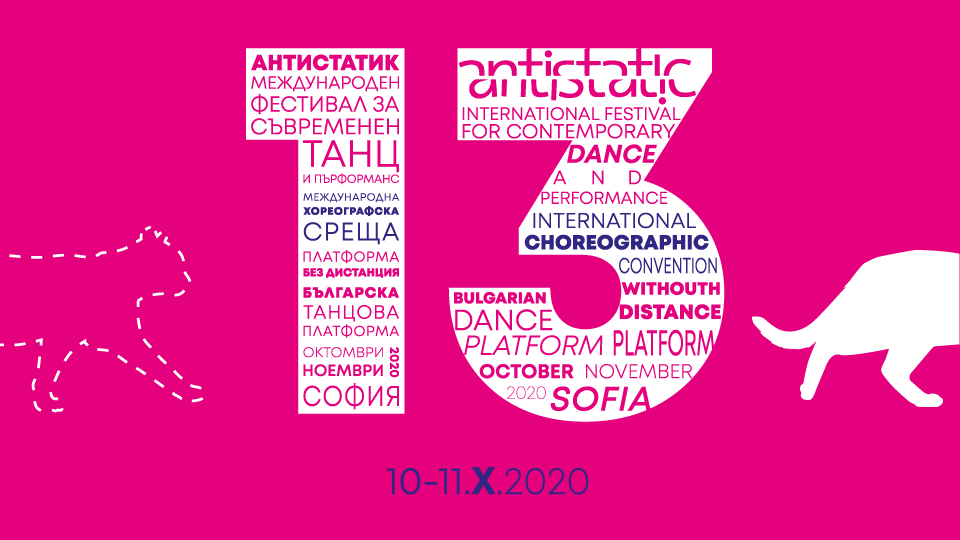The Choreographic Convention V: “Movement Research” offers a space for dialogue and reflection on new perspectives and approaches to movement research by focusing on four main topics: movement research as an artistic practice, as a form of work with dance archives and its interactions with new technologies and in social movements and contexts.
Where: Goethe Institut-Bulgaria, Sofia, Bulgaria
online on the “Antistatic” Facebook page (@antistatic.international.festival)
When: October 10 – 11, 2020 at 11 AM – 5 PM UTC+03
Choreographic Convention V: “Movement Research” is part of the “Choreographic Convention” Programme of the project “Life Long Burning – Towards a Sustainable Ecosystem of Contemporary Dance in Europe”. Its 5th edition will take place in Sofia (as well as online), as part of the programme of the 13th Antistatic Festival. The meeting is curated by Iva Sveshtarova, Angelina Georgieva, Willy Prager, Stephan A. Shtereff and accompanied by an artistic programme with performances related to the main topics.
Ever since its introduction into dance-making by the pioneers of modern dance, and especially since experimental dance collectives turned improvisation into an artistic practice in the United States in the 1970’s, movement research has generally been understood as a process of finding and generating movement material beyond existing dance vocabulary. Movement is differentiated as an essential materiality of dance, and research takes place in the body of the dancer. The body experiments with kinetic potential or appropriates movements from different spheres of life, on the basis of which it develops movement language. But movement research also operates on a much broader level, which we can only briefly outline here.
Contemporary choreography has complicated the attitude that the body and movement are the main means of expression in dance. They have been subjected to radical deconstruction, examining their culturally assigned meanings. The notion of choreography as an expanded practice has largely emancipated itself from dance and has become increasingly interested not in the individual expressiveness of the body and movement and in shaping them through various techniques, but in the relations they create with other bodies and objects in multi-layered aesthetically organized situations, as well as in their socio-political significance. Digital and dance artists have incorporated new technologies as a creative and research tool that expand the notions of bodily boundaries. Various software programs make it possible to capture, analyse and reconfigure movement in any environment – physical, virtual, visual or acoustic… The growing interest in the history of dance in recent decades has raised questions of the possibilities for archiving, researching and reconstructing the kinetic knowledge of the past.
Programme
10 October 2020// 11 a.m. – 5 p.m.
Keynote Speech
Alexandra Kolb: “Beyond Dance: The Politics and Philosophy of Movement Research”
Panel 1: Approaches to Movement Research as an Artistic Practice
Moderator: Yasen Vasilev
Participants: Galina Borissova (Bulgaria), Kroot Jurak (Estonia/ Austria), and Thomas Lehmen (Germany)
Panel 2: Movement Research and Dance Archives
Moderator: Angelina Georgieva
Participants: Corina Cimpoieru (Romania), Isa Wortelkamp (Germany), Rok Vevar (Slovenia), Sasa Asentic (Serbia/Germany)
Artistic Programme
7 p.m. // DNA – Space for Contemporary Dance and Performance, Sofia, Bulgaria
„Goldberg Variations”
Performed by: Jurij Konjar (Slovenia)
11 October 2020//11 a.m. – 5 p.m.
Panel 3: The Potential of the System
Moderator: Venelin Shurelov
Participants: Antoni Rayzhekov (Bulgaria) and Marco Donnarumma (Italy)
Panel 4: Protesting Body in Different Social Movements and Contexts
Introductory statement: Sandra Noeth (Germany)
Participants: Ivaylo Ditchev (Bulgaria), Ole Frahm (Germany) and Taoufiq Izeddiou (Morocco)
Artistic Programme
7 p.m. // DNA – Space for Contemporary Dance and Performance
“DragOn aka Pony”
Dance, choreography, performance: Aleksandar Georgiev, Zhana Pencheva and Darío Barreto Damas aka STEAM ROOM (Bulgaria, North Macedonia, Spain)
How to register: Due to the anti-epidemic measures, the seats in the hall are limited number that is why a pre-registration via e-mail at antistaticfest@gmail.com is mandatory.
Also the meeting will be broadcast online on the “Antistatic” Facebook page (@antistatic.international.festival) where no registration is needed.
Free for participants.
Contact details: antistaticfest@gmail.com or FB @antistatic.international.festival
For further information, please visit http://antistaticfestival.org/

